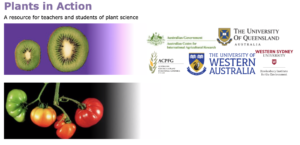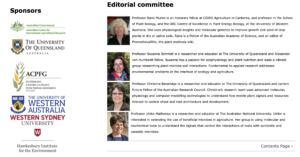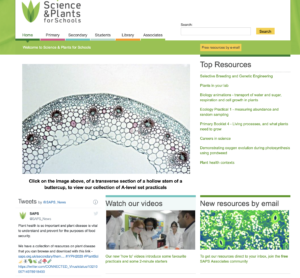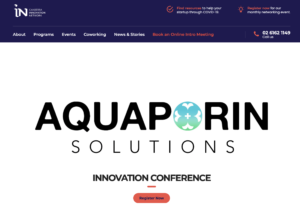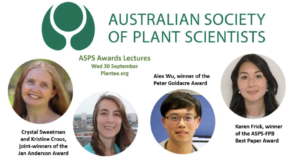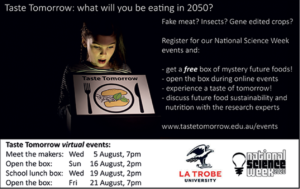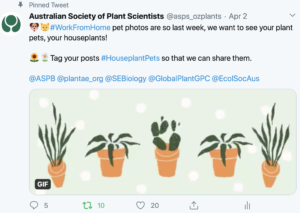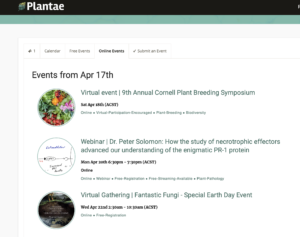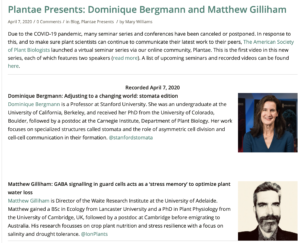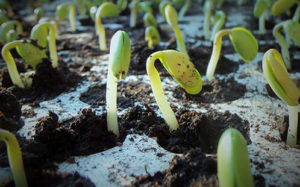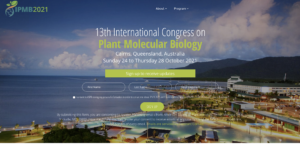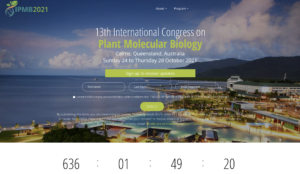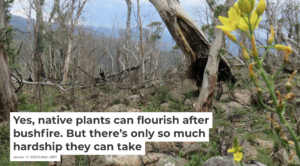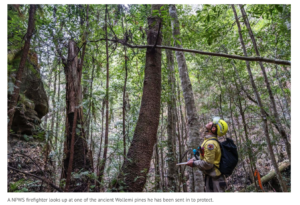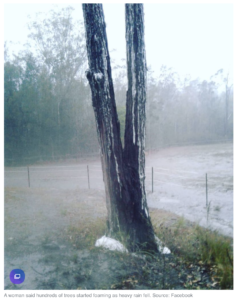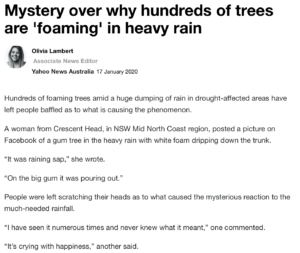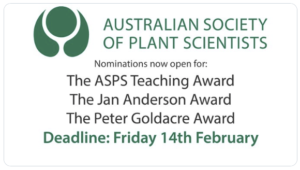- About
- Members
- Join
- Member log in
- Membership Renewal
- Member directory
- Life Members
- ASPS Life Member Professor Graham Farquhar
- ASPS Life Member Associate Professor Hendrik (Hank) Greenway
- ASPS Life Member Dr Marshall (Hal) D Hatch
- ASPS Life Member Dr Paul E Kriedmann
- ASPS Life Member Dr Mervyn Ludlow
- ASPS Life Member Emeritus Professor Rana Munns
- ASPS Life Member Conjoint Professor Christina E Offler
- ASPS Life Member Professor (Charles) Barry Osmond
- ASPS Life Member Emeritus Professor John W Patrick
- ASPS Life Member Dr Joe Wiskich
- Corresponding Members
- Elected Fellows
- Events
- Awards & Funding
- Employment
- Publications
- Research
- Teaching
- Menu
October 2020 Phytogen – The Race That Stops Every Nation
30 October 2020
“From the ASPS President: The Race That Stops Every Nation”
There’s only one race scientists should be watching on the first Tuesday in November 2020 and it’s being run in Washington DC, not Flemington. All scientists should be glued to their wirelesses and mobile devices or listening through their earphones as they pipette and plate-out because the outcome of this race could affect us all for the foreseeable future.
ASPS is a scientific society so let’s put politics aside – if we can. Having said that there really is only one runner in this two-horse race that deserves our virtual support – Joe Biden. By any objective measure President Trump has done enormous damage to the standing of science in his country and to evidence-based policy making in general. These failures now threaten the very health of his own population. President Trump has downplayed the threat of global warming, ignored experts and plans to withdraw from the Paris Climate Agreement. He has dismissed public health recommendations and lied about the severity of the pandemic and he has openly derided Joe Biden for wearing a mask so often. Even after contracting the virus himself he dismissed the disease and instead focused on his own strength. Yet a recent study from Standford University (Bernheim et al., 2020) estimates that 30,000 cases and 700 Covid19-related deaths can be directly linked with the Trump rallies, most of which were conspicuous for their lack of masks and social distancing.
If we are to meet the many challenges of the future head-on, our communities need to have faith that the information we receive is the truth and that the decisions affecting our lives are based on the best possible information. This social capital needs to go hand in hand with an active scientific community that is independent, transparent and resilient to false claims and misrepresentation. We also need a generation of leaders that we can respect and trust. Without these things, communities will not understand, believe in or commit to the policies and pleas of our leaders who ask us to sacrifice our lifestyles or our liberties for the greater good. Little of President Trump’s performance during his first term deserves our respect or our trust.
Too political for a small society of plant scientists? Of course, I do not speak on behalf of all members of the ASPS. However those of us who do think this way are in good company. In unprecedented moves, three of the world’s top scientific journals (Nature, Science and The New England Journal of Medicine) have for the first time openly endorsed a presidential candidate – Joe Biden.
Dr Peter Ryan
President of the Australian Society of Plant Scientists
Bernheim, B. Douglas and buchmann, Nina and Freitas-Groff, Zach and Otero, Sebastián, The Effects of Large Group Meetings on the Spread of COVID-19: The Case of Trump Rallies (October 30, 2020). Available at SSRN: https://ssrn.com/abstract=3722299
Thinking about our next generation
It is usually about this time of year that Science meets Parliament occurs. Due to Covid-19 it has been postponed. In the meantime, plant science is more important than ever for our next generation of scientists, students and people interested in plant science.
In the last week, Melbourne and Victoria have been able to slowly resume a pre-Covid-19 existence. It has been such a strange year and these hard times have been a struggle.
Many teachers and tutors have moved from lecturing to online courses. Please remember to make use of Plants in Action to prepare your teaching.
How are you going with twitter/facebook?
To spread the news about all the great plant science you do, areas that interest you and that may be of interest to students and the general public, tag us: (@asps_ozplants). This will then show up in our twitter feed as a mention and we can retweet and add comments promoting you further. This is also a great opportunity to welcome Frances Sussmilch from University of Tasmania to communications.
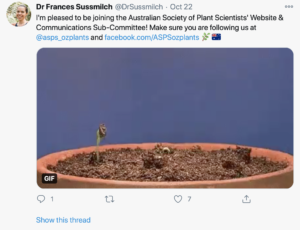
Thanks again to Tam Salter and we would like to invite anyone to contact us at communications if you would like to help us with twittering and facebook.
Interesting articles
There are several articles in Functional Plant Biology.
This one identifying salt tolerance QTL’s caught my attention, well done. 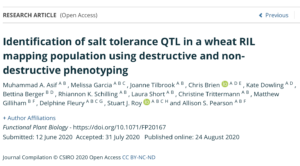
Hows’ this: Professor Rachel Burton let me know about how South Australia had all its power coming from solar panels for just over an hour Sunday 11th October 2020, a world first for a major jurisdiction.
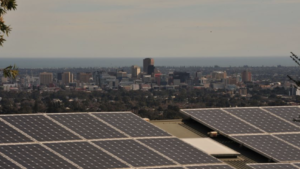
Science and Plants for Schools (picture below) is a great resource from the UK.
Let us know (@asps_ozplants) if you have any interesting articles or resources you would like to share.
Roundup from September 2020 ASPS award presentations hosted by Plantae and 2020 ASPS AGM
If you would like to see the award talks from last month, head to Plantae presents and the video is embedded below.
At the end of our AGM there was a teaching award presented to Hank Greenway. Watch the video below. You can read about critical thinking and thought experiments in a previous issue of Phytogen from June 2020.
Events
Please let us know (@asps_ozplants) if you have any interesting events.
Launched in October was The Earthshot Prize
The workshop is open to everyone, it’s free and online, https://cbrin.com.au/events/aquaporins-solutions-exploring-how-aquaporins-can-solve-food-and-water-challenges/
Session 1 – Monday 2nd November – understanding aquaporin regulation
Session 2 – Tuesday 10th November – characterising plant aquaporins
Session 3 – Monday 16th November – using aquaporins to solve real world problems
Session 4 – Monday 23rd November – pitching ideas for solving aquaporin mysteries
Please note that separate registration links and timing information for each session are included within the above website link.
September 2020 – Phytogen – ASPS Awardees Plantae Presents AGM Thursday 1st October
21 September 2020
Welcome, just a small issue to remind you to please join us at the end of September; Wednesday 30th September, for a special edition of Plantae Presents, featuring four Australian Society of Plant Scientists awardees: the joint-winners of the Jan Anderson Award, Crystal Sweetman and Kristine Crous; the winner of the Peter Goldacre Award, Alex Wu; and the winner of the ASPS-FBP Best Paper Award, Karen Frick. Each will present a 15 or 20 minute talk, followed by five minutes of questions. This is a two hour webinar with the start times indicated below.
Wednesday September 30th 2020 is Plantae Presents
Adel/Dar 4.00pm
Syd/Melb/Bris/Hob/Can 4.30pm
Perth 2.30pm
UK 7:30am, CET (Central European Time) 8:30am, EDT (Eastern Daylight Time) 2:30am, (PDT 11:30 pm Tues Sept 29, Pacific Daylight Time)
You can now register through the link below!
On the following day, Thursday 1st October 2020 is ASPS AGM 12-2pm Adel/Dar; 12.30-2.30pm Syd/Melb/Bris/Hob/Can; Perth 10.30am.
The registration link for the AGM is – https://anu.zoom.us/meeting/register/tJwvdOutrjojG9eIIHzpt2ElNXnit2sxBtbu
|
Welcome! You are invited to join a meeting: ASPS AGM. After registering, you will receive a confirmation email about joining the meeting.
anu.zoom.us
|
This is also an opportune time to check and renew your membership. We hope you can also encourage some fellow colleagues and students to join our society.
August Phytogen – Science week is coming……
09 August 2020
National Science Week 2020 is coming…….
An event at La Trobe University is “Taste Tomorrow“
What is the taste of tomorrow?
The year is 2050 and you have just sat down to your insect burger in a genetically modified plant bun with some seaweed dangling out the side and a bowl of native yam chips…sounds delicious, right? What we eat is incredibly important for our health and the sustainability of our planet.
Poor diets are a major cause of health, economic and environmental problems that every country experience. Many have the double burden of both undernutrition coexisting with obesity and other diet-related non-communicable diseases (Global nutrition report, 2020). Producing healthy food sustainably also comes with its own challenges as we battle with climate change, degraded soils, limited land due to urbanisation and the need to protect habitat…all with a population growing to nearly 10 billion by 2050. The need for agricultural researchers, farmers, nutritionists and health professionals to work together has never been more critical. So, what is the answer?
Researchers from La Trobe University will discuss these questions during National Science Week (15 -21 August) in a series of events called ‘A taste of tomorrow: fake meat, sautéed spider and lobster lollies?, organised by Dr Kim Johnson from the La Trobe Institute for Agriculture and Food, Susan McLeod in the Dept of Dietetics, Nutrition and Sport and Dr David Hoxley, Dept of Chemistry and Physics. The events explore a range of foods that could be available to us in future that are nutritious and can be sustainably produced. People who register for the events have been sent a mystery box of ‘future foods’ that they can taste together with the panellists and other attendees at live events.
The project aims to make science accessible to the public in a fun and engaging way, food being something we can all relate to! The events will also make scientists accessible to the public and explore why we choose to eat the foods we do and how they are produced. A range of resources, from experiments, recipes and fact files are also available on the taste tomorrow website (www.tastetomorrow.edu.au) so people of all ages to play with their food!
Author:
Dr Kim Johnson, Senior Research Fellow, La Trobe Institute for Agriculture and Food, La Trobe University
Student reports from La Trobe University ASPS2019
I hope you will enjoy reading the last of student reports from when we met up at La Trobe University last year. I put in the image of the cherry tree and the video of the mimosa for you to enjoy in conjunction with Pawel’s childhood memories… read on.
MiingTiem Yong, PhD Candidate, School of Science, Western Sydney University
I am grateful to have had this opportunity to attend the 1st ASPS conference held on 25th – 29thNovember 2019 at Latrobe University in Melbourne as my first career-related conference to broaden my professional development.
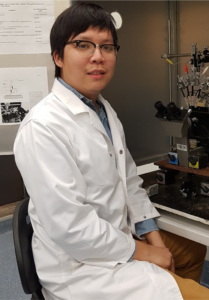
ASPS2019 poster session provided me a very good platform to present my PhD research on salinity tolerance in wild Oryza spp, and the identification and mechanism evaluation for salinity tolerance enhancement in cultivated rice (Oryza sativa). My poster presentation mainly focused on tolerant species identification via electrophysiological measurement and cellular reactive oxygen species and sodium imaging in the mesophyll cells. I really enjoyed this session to explain my results and received a lot of useful feedback from other plant scientists. The outstanding work presented by other participants, were also exciting and inspiring, particularly the valuable messages from Mr James Fazzino, the advanced phenotyping work from Prof Richard Trethowan, salinity-root work from Dr Megan Shelden and all of the incredible stories from the research group.
Paweł Gluza, PhD Candidate, School of BioSciences, Faculty of Science, University of Melbourne
When I was a kid, my grandpa got mad at me once for trampling over his wheat in the fields. “Why bother?!” – I snapped angrily in polish – “they’re going to grow back, they always do”. He frowned but for a moment and then took me by the hand and took me for a long walk, where a little city boy learned the beauty of nature from a wise old farmer. He opened my eyes to a world of miracles; showed me the sap oozing from a gean tree; led to the marsh where Venus flytraps grew; made mimosas flinch. He encouraged me to observe how daisies open in the morning and how the barley slowly yellows and hunches over its burden. He taught me respect and curiosity; made me the plant scientist I am today. So when I packed my bags and moved to Australia to pursue my PhD in botany, I knew that he would be proud of me.
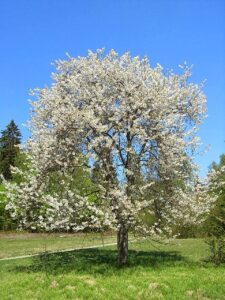
Gean, Wild Cherry, Prunus avian. Image from trees planet
Things have not always been going smoothly. All-nighters were killing my social life, lab equipment simply loved to refuse to cooperate and all the friends and family were left behind oceans. However, one thing that I have noticed about Australian plant community is that everybody was extremely friendly and my colleagues made me feel like home from the get-go. With massive help from their side, I enjoyed a few lucky ‘eureka moments’ and was lucky enough to be able to show my results at a few conferences.
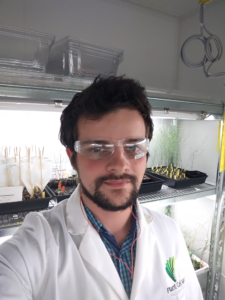 One of the memories I am most fond of is ASPS2019when I travelled to the picturesque suburb of Bundoora to present my work. The sessions were preceded with an integration session for students, where I made new lasting friendships and then all of us entered the room where we stayed for the next three days of neural stimulation, leaving only to refill the coffee, enjoy the fantastic chicken curry pies and observe elusive sugar gliders in the park across the road. While I felt like a teenager on a rock concert to watch my heroes of youth take the stage (that is: people that authored the papers I based my BSc thesis on), I also had the opportunity to actually fire back at them with all the data I packed on my poster (actually a poster and a half, since I co-authored one as well – how good is that?!).
One of the memories I am most fond of is ASPS2019when I travelled to the picturesque suburb of Bundoora to present my work. The sessions were preceded with an integration session for students, where I made new lasting friendships and then all of us entered the room where we stayed for the next three days of neural stimulation, leaving only to refill the coffee, enjoy the fantastic chicken curry pies and observe elusive sugar gliders in the park across the road. While I felt like a teenager on a rock concert to watch my heroes of youth take the stage (that is: people that authored the papers I based my BSc thesis on), I also had the opportunity to actually fire back at them with all the data I packed on my poster (actually a poster and a half, since I co-authored one as well – how good is that?!).
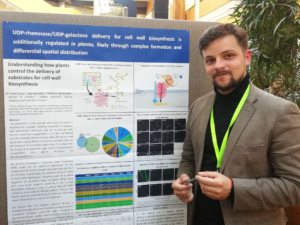
I could never thank the organizing committee enough for making it possible for me to participate in this and I hope that we all meet again. Until then – may we never lose the passion that pushes us towards the discoveries and may our enthusiasm and knowledge make this world eventually a better place.
A huge thanks to the Australian Society of Plant Scientists for organising this fantastic event and the ASPS2019 student travel support. I believe all of the participants are inspired from the ASPS conference. I am looking forward to continuing collaboration at the Combio conference 2022 in Melbourne.
Ying Meng, PhD candidate, School of Agriculture, Food and Wine, University of Adelaide
My research is focused on a better understanding of how gamma-aminobutyric acid (GABA) contributes to the stress responses of plants, using the model plant Arabidopsis (At). During my PhD I have induced Salt stress and hypoxia stress on wild type and mutants. The mutants are GABA-deficient lines, GABA-accumulating lines by GAD2 overexpression or through GABA-T deficiency.
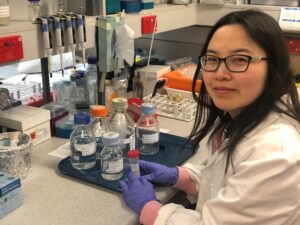 Plant science is always fascinating and full of mysteries. I am grateful for ASPS providing the student travel grant for me to attend the 2019 conference and meet so many people who are doing interesting research and are passionate about plants. Plants cannot move and it seems they cannot do much about all the changes in their environment and so have to adapt to them. Plants are quite smart and plant scientists are trying their best to understand how and why many adaption pathways or signals work.
Plant science is always fascinating and full of mysteries. I am grateful for ASPS providing the student travel grant for me to attend the 2019 conference and meet so many people who are doing interesting research and are passionate about plants. Plants cannot move and it seems they cannot do much about all the changes in their environment and so have to adapt to them. Plants are quite smart and plant scientists are trying their best to understand how and why many adaption pathways or signals work.
During the poster presentation sessions, I was fortunate to get some feedback and suggestions, and to meet senior academics. It was such a good opportunity to be able to communicate our work in different specific fields and burst out new ideas. Being a member of ASPS community has encouraged and enlightened me to work harder and discover more about the plant kingdom.
Nick Booth, PhD Candidate, College of Science and Engineering, Flinders University of South Australia
The Australian Society of Plant Scientists Conference 2019 was a great experience to attend as a first year PhD candidate. I was given the opportunity to network with a range of academics whose work I am extremely familiar with but had not had the opportunity to meet. In my opinion, ASPS 2019 was a particularly successful meeting, largely due to the sole plant focus and that there was no overlap between presentations, meaning there was no excuse to miss a great talk!
My research focuses on nitrogen fixation in legume crops, this is a symbiotic process by which a soil-borne bacterium converts nitrogen gas into a form usable by the plant. Heading into ASPS 2019 I had no idea how many people I would meet working in such a similar field. Throughout the meeting I established great connections with many other students and academic staff. One of the more beneficial discussion I had was troubleshooting a transformation method with Courtney Winning of the Djordjevic lab, this protocol is now running a lot smoother in my lab.
Overall, ASPS 2019 was an unforgettable experience and I thoroughly look forward to the next meeting!
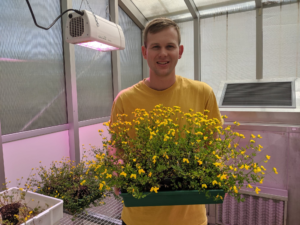
Events
Stay tuned for Plantae Presents talks from our ASPS 2020 award winners.
Peter Goldacre Award – Alex Wu.
Award is proudly sponsored by Functional Plant Biology.
Jan Anderson Award (joint winners)- Kristine Crous and Crystal Sweetman.
Award is proudly sponsored by CSIRO Agriculture and Food, the ARC Centre of Excellence in Plant Energy Biology and the ARC Centre of Excellence for Translational Photosynthesis.
ASPS Teaching Award – Hank Greenway, David Turner, Jane Gibbs and Brian Atwell.
These will be at the end of September and exact dates will be finalised soon.
You can email us at the communications website if you have upcoming events to promote, virtual and face-to-face. Please also send us any enlightening stories to share.
Take care and stay safe.
June 2020 Phytogen – For our students
06 June 2020
This issue of Phytogen is for our students. I hope you enjoy reading reports from students presenting posters at last years ASPS2019 at La Trobe University in Melbourne.
We also have an article by Hank Greenway about teaching critical thinking (Greenway Critical thinking….). The article was written by Hank Greenway, UWA, and reflects on his teaching strategies developed in the 1980s and that are relevant today.
This article draws attention to a Feature Essay to be included as part of Chapter 3 in Plants in Action.
The Essay gives a detailed explanation of the essay topic and Hank’s development of thought experiments.
Using thought experiments to strengthen critical thinking at Universities
by Assoc/Prof Hank Greenway
Honorary Research Fellow, School of Agriculture and Environment, The University of Western Australia.

During the 1980s, I began using thought experiments in my courses on environmental plant biology to develop critical thinking in undergraduate students and young researchers. These thought experiments proved to be of great help to students and researchers in developing the rigour of their research and their ability to interrogate published information. They mastered the background material necessary to tackle the thought experiments, and they formulated and solved thought experiments, reinforcing their practice of the scientific method. The approach differs from that where the scientific method is described without involving logical reasoning and critical appraisal by students.
Briefly, thought experiments consist of:
1) Formulating the problem (enigma) and setting a hypothesis.
2) Designing an experiment(s) to solve the enigma.
3) Considering how far the suggested experiment(s) go towards solving the enigma and what new questions they raise.
An example is described in a featured-essay-in-Chapter-3-of-Plants-In-Action, co-authored with Jane Gibbs, David Turner and Brian Atwell. In our example, the essential background material is regulation of solute uptake and of cytoplasmic pH, subjects that are eminently suited to foster innovation and independent thought. These themes are relevant to how plants ‘manage’ in their physical and chemical environment. A similar approach is feasible in other disciplines.
A statement by Frank Carrigan, Macquarie Law School, that ‘…university teaching is there for people to take ownership of their learning’ seems so obvious. Yet it took me years at The University of Western Australia to find a design that motivated students and young researchers to become independent and skilled in critical thinking and debating their views. My specific purpose was to foster independence and engender confidence to test new ideas, with an emphasis on skills in practising the scientific method. In my experience, the approach outlined here and in detail in our featured-essay came closest to achieving this objective.
Student reports from La Trobe University ASPS2019
Bo Eng Cheong, PhD candidate, School of BioSciences, Faculty of Science, The University of Melbourne
I am Bo Eng Cheong, a final year PhD candidate from Professor Ute Roessner’s laboratory of School of BioSciences, the University of Melbourne. My PhD study focused on the understanding of cold acclimation response in Australian spring wheat cultivars upon cold stress (chilling, frost), by using metabolomics and lipidomics approaches. This study is also collaborated with Dr Rudy Dolferus from the CSIRO (Commonwealth Scientific and Industrial Research Organization) in Canberra.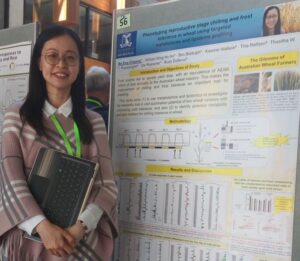
I became the member of Australian Society for Plant Scientist (ASPS) since 2016. I was excited to participate in the “ASPS 2019 Bringing Plant Science Together” conference to present my work via poster entitled “Phenotyping reproductive stage chilling and frost tolerance in wheat using targeted metabolome and lipidome profiling”. During the poster viewing session, I received so many positive feedback and comments from the audiences that come from different background such as academic field, industry, and research organization. I also gained many extra information about the wheat crop and the current situation of the crop production in Australia during the Grains Satellite meeting, which was held on the last day of the ASPS 2019 conference. All those invaluable comments and information I gained during the conference are very useful to further consolidate my study and helpful during my thesis writing.
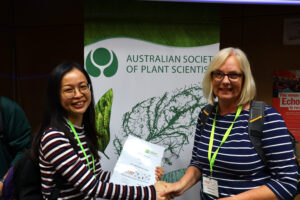
What makes me more excited is that when I was announced as the 1st prize winner for the ASPS Student Poster Competition. This is totally beyond my expectation! I was so touched and couldn’t hold back my tears when I received the award. Not only because I won the prize, but mainly because of my hard work get paid off and my study is recognized by people. Thank you so much ASPS 2019! Thank you so much to my beloved supervisors, collaborators and all the people that have helped me to make this study successful! ASPS 2019 will definitely become one of the sweetest journeys that I will cherish in my life!
Meridy Price, PhD student, School of Natural Sciences: Life Sciences, University of Tasmania
After finishing my honours project at University of Tasmania in 2019, I attended the ASPS 2019 conference at Latrobe University. This was my first conference I had attended, and I was thankful for the opportunity to present a poster on my honours research topic while I was there. My poster was based on my research into germination response to temperature in three native Australian forb species; Microseris walteri, Bulbine bulbosa, and Arthropodium fimbriatum and how local climate affects germination response curve and thermal germination niche in fragmented populations of these three species.
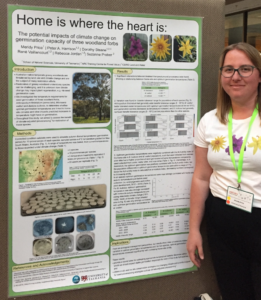
I was excited to take my findings to ASPS 2019 and share them with my fellow plant scientists and I received a lot of positive feedback and some great tips while I was there. This experience was my first time presenting my research to other academics and I was honoured to win second prize in the student poster competition.
I am truly grateful for the effort and expertise of the team that organised ASPS 2019, it was a terrific opportunity to listen to what other researchers are working on. I especially enjoyed Prof Jennie Brand-Miller’s talk on carbohydrate nutrition and Dr TJ Higgins’ discussion on how to educate people about GMOs. I started on my PhD not long after the conference ended (only a month later) and I hope to have some exciting results to share with the ASPS in the future.
Deepak Baranwal, Plant Breeding Institute, University of Sydney
I am Deepak Baranwal, a PhD candidate at the University of Sydney, Plant Breeding Institute. ACIAR John Allwright fellowship supports current PhD study. Aim of this study was to discover novel rust resistance genes/QTL in wheat. Evolution of virulent rust pathotypes stresses to detect effective genes /QTL and their deployment in Australian wheat varieties. To address the objective, bi-parental and association mapping populations have been characterized against aggressive rust pathotypes and genotyped using Illumina 90K SNP array and targeted genotyping-by-sequencing approach. Two chapters of the study have been presented as oral talks in COMBIO-2018 and ASPS-2019.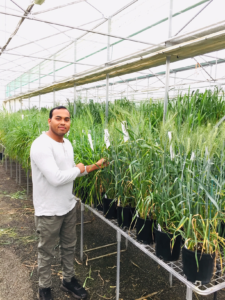
I joined the Australian Society of Plant Scientists (ASPS) as a student member. It offers a golden opportunity to interaction research leaders across the Australasia. I have participated in COMBIO-2018, held at the International Convention Centre, Sydney. I delivered the first talk of my PhD journey at this conference. This conference offered a fantastic opportunity to network with a vibrant scientific community. I was overwhelmed with this positive vibe and registered for ASPS-2019. I acknowledged the ASPS travel grant to present my work at Agri Bio, La Trobe University, Melbourne. Active engagement of participants in the networking program was outstanding. Most of the sessions were targeted to Plant Science community. I truly enjoyed this conference and it would be a great memory of my PhD journey.
Abi Ghifari, School of Molecular Sciences, University of Western Australia
I am Abi Ghifari, a PhD candidate at the School of Molecular Sciences, University of Western Australia. I was grateful to receive the Australian Society of Plant Scientists (ASPS) Travel Award to attend the 2019 ASPS Conference in La Trobe University, Melbourne. Being my first conference ever since I started my PhD journey, I was excited to share a part of my studies to wider community of scientists as well as to hear latest research from fellow graduate students and leading scientists.
In this conference, I presented a poster on one of my research focus about investigating the molecular and biological functions of a new proline aminopeptidase in a model plant, Arabidopsis thaliana. Aminopeptidases are a group of enzymes responsible for recovering single amino acids from short peptides. Therefore, they are essential in the last stage of proteolytic and peptidolytic reactions within cells and the deletion of their functions have implications in plant growth and stress response. During the presentation, I had a lot of insightful discussions with fellow presenters regarding how to improve my experimental design and data analysis and received positive feedback, which encouraged me to further continue my research. By presenting my research in this conference, I had a chance to increase my profile visibility as an aspiring scientist as well as establish a good networking with fellow students and potential future collaborators and employers.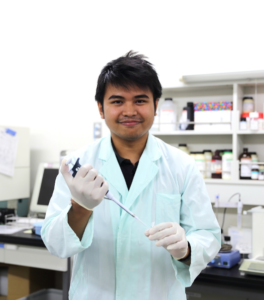
This conference was also a great opportunity to hear latest results from national and international leaders in plant science. Topics and applications were widely ranging, from laboratory bench, greenhouse, and field, yet with the shared ultimate goal of increasing efficiency of plants in tackling various environmental conditions. I was also grateful as in this occasion, my supervisor Dr Monika Murcha was awarded Jan Anderson Award for her consistent research in plant science. Overall, I am deeply grateful for the ASPS to award me a travel grant to attend this wonderful conference.
Tetsuya Ishikawa, PhD Candidate, Tasmanian Institute of Agriculture (TIA), University of Tasmania
ASPS Conference 2019 at La Trobe University was quite meaningful as professional people in the field of plant science in Australia and the world met together to have great discussions. La Trobe University is located in a suburb of Melbourne, and its peaceful atmosphere was quite comfortable and delightful. I appreciate ASPS to provide me Student Travel Grant that was quite helpful to attend this conference. Over the four days of the conference, a lot of aspects in the field of plant science were discussed that developed better understandings and especially will contribute to future food production. This conference also provided us opportunities for networking that widened and strengthened our global community.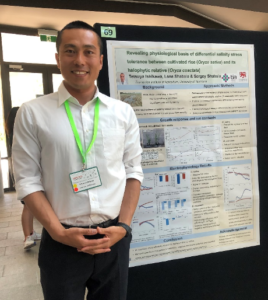
I could communicate my research outcomes as a poster presentation; “Revealing physiological basis of differential salinity stress tolerance between cultivated rice (Oryza sativa) and its halophytic relative (Oryza coarctata)”. Feedbacks from professional researchers and students from other institutions were quite helpful to improve my ongoing research. Widened my networking will contribute to my future career development, especially after I graduate PhD study. I also attended a wildlife sanctuary tour which is organised by ASPS and La Trobe University staff. It was pretty wonderful, and fortunately, we could see a sugar glider that was the most exciting moment. I enjoyed and learned a lot from this conference, and this experience is unforgettable and precious in my career.
Phan Thi Thanh Hoai, University of Adelaide
Greetings! I’m Phan Thi Thanh Hoai, an international student at the University of Adelaide, undertaking my PhD research in the field of plant science. My research is focussed on exploring the roles of aquaporins in seed imbibition and germination. I am supervised by Dr Caitlin Byrt from The Australian National University, and Professor Steve Tyerman and Dr Jiaen Qiu from the University of Adelaide.
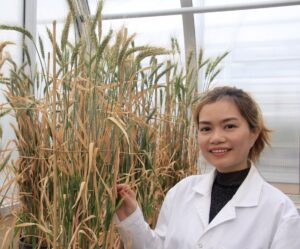
From a very young age, I was always intrigued by abundant colourful flowers and delicious fruits from my hometown in Vietnam. Then questions came into my mind about how plants generate food products, and this inspired me to study plant science. Plant science revealed to me that plants are complicated. Hidden within plants are many biological secrets waiting to be discovered. At the moment, my research is focused on seed imbibition and germination, the very first stages of when plants start their life journeys, and my specific research questions relate to investigating processes influencing water transport during these critical phases of development. Please see the following review to learn more about this topic: Hoai et al., 2020. Deciphering aquaporin regulation and roles in seed biology. Journal of Experimental Botany, 71(6), pp.1763-1773https://doi.org/10.1093/jxb/erz555.
Attending the 2019 Australian Society of Plant Scientists Conference in Melbourne was a great privilege, and I am especially grateful to ASPS for supporting a travel student award so that I could participate and share my research outcomes. The conference was a fantastic opportunity to learn more about the latest advances in plant science and meet other plant scientists in Australia and other countries. I also had a chance to present my results in a presentation and a poster. I received useful feedback from generous and experienced senior scientists and felt more enthusiastic and motivated when I returned home to continue to pursue my research. As a result of participating in the conference, I have established connections with other researchers and beyond, I feel more confident about communicating with the greater scientific community and I’m looking forward to building on the networks I developed to create collaborative opportunities in the future.
Zeenat Rupawalla, Institute for Molecular Bioscience, University of Queensland
I received a travel grant from the Australian Society of Plant Sciences which helped me attend the first time ASPS conference 2019 held in Melbourne – La Trobe University. This provided me the opportunity to meet other plant scientist at different stages of their careers. This conference not only allowed me to present my first year PhD work, but also enabled me to learn from other PhD students and plant scientist. Through this, I was able to develop adequate professional contacts that will aid in my future career development and open opportunities for me after I finish my PhD.
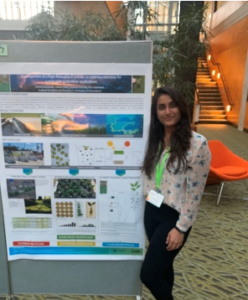
Moreover, presenting my work as a poster helped propagate some interesting conversations which has greatly benefited me to address some potential problems I would face in my project. My project is more inclined towards the commercialisation of biological soil additives using microalgae and cyanobacteria from wastewater systems. This can pave way for circular bioeconomy and contribute to sustainable agriculture in the future to feed a growing population of 9.8 billion people by 2050 (FAO 2016).
Ultimately, it was so inspiring to see other PhD students’ posters as well as their presentations, and to know that we are a part of the future tackling problems in the sustainable agriculture space. I am very grateful for ASPS for giving me the opportunity to present my work at ASPS 2019, and to be a part of the plant science community.
R.N. Robertson Travelling Fellowship, Juan De La Cruz Jimenez Serna, UWA.
In my PhD studies at the University of Western Australia, I have focused on the identification of physiological traits associated with the tolerance of the C4 perennial grasses Urochloa spp to waterlogged acidic soils.
In my studies, we have found that root traits including higher aerenchyma percentage, lower stele area, suberized exodermis, lignified sclerenchyma and a barrier to impede the radial O2 loss are helping to improve plant internal aeration, thus, facilitating the O2 movement from shoots to roots and enabling root growth and nutrient uptake under low-O2 conditions. Moreover, from our studies on root radial O2 loss in response to toxic ions (i.e., Fe+2) and low-O2(deoxygenated agar) treatments, we found out that the development of a barrier to impede radial O2 loss also prevents the entry of toxic ions into the roots.
In several meetings with my supervisor Prof. Tim Colmer, we discussed about the results of my research and the need for measuring root respiration and root cellular O2 concentration in plants growing in low-O2 conditions. These measurements are key for understanding the influence of low-O2 conditions on processes such us root growth and nutrient uptake and would provide important data to understand functioning of roots under limited O2 conditions. Fortunately, Prof. Ole Pedersen from the University of Copenhagen visited our lab in Perth in 2017, we discussed with him our data set and he offered the opportunity for me to visit his lab and do the measurements required.
Thanks to the R.N. Robertson Travelling Fellowship, the Australian Society of Plant Scientists and funds from Prof. Tim Colmer and Prof. Ole Pedersen, I was able to visit Prof. Ole’s Lab, the Freshwater Biological Laboratory of the University of Copenhagen in Denmark. Prof. Ole’s lab is a state of the art laboratory with unparalleled facilities for measuring root tissue O2 status. The lab has O2 microelectrodes, micro-manipulators, respiration chambers and the gas mixers needed to run my experiments.
Before travelling to Denmark, I sent seeds from two genotypes (previously evaluated during my PhD) having contrasting root features. The seeds were planted before I arrived and after establishment, the plants were grown in controlled conditions of light and temperature in pots filled with deoxygenated stagnant medium during three weeks (Fig. 1). 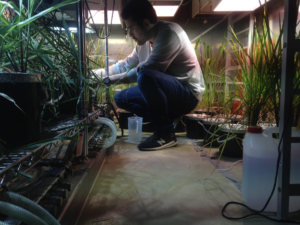
Fig. 1. Plants growing in deoxygenated stagnant conditions under controlled light and temperature.
Individual plants were used for measurements of root tissue O2 status by radial profiling across intact roots (from external medium, across the epidermis and outer tissues, cortex and into the stele). The shoots were sealed off in a chamber and the roots were on stirred water at O2 equilibrium (Fig. 2).
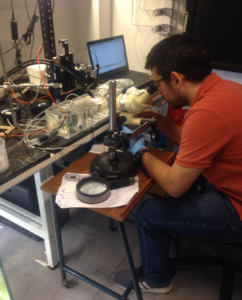
Fig. 2. Experimental set-up. The roots are in stirring water at O2 equilibrium and the shoots are in a chamber with controlled O2 concentration. Microscope is used to position the microelectrode, and O2 profiles are taken by slightly moving the microelectrode using a micromanipulator and a computer system.
The roots were reliant on internal O2 supply via root aerenchyma and the concentration of O2 in shoots was manipulated (21 or 42% O2 concentration) using gas mixers. Moreover, the temperature of the water medium was controlled at 5 or 25 °C.
This research collaboration using an unique set-up has helped us to increase our understanding of tissue O2 status within roots under low-O2 conditions when the external conditions (i.e. O2 concentration and temperature) change. Moreover, in this project we could elucidate some physiological aspects of root aeration under low-O2 conditions. In fact, measurements of O2 profiling have been merely done in wetland plans, thus, this work reinforces the understanding of O2dynamics in C4 grasses. This knowledge adds invaluable significance to my previous findings and adds important data for my PhD thesis.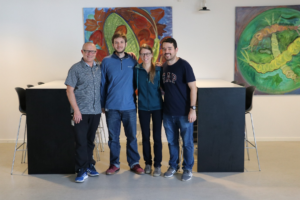
Fig. 3. From left to right. Prof Ole Pedersen, PhD student Lucas Ogorek, Dr. Elisa Pellegrini and myself.
This project has been very educational for me, having worked side by side with Prof. Ole (an expert and top scientist on responses of plants to low-O2 conditions) and his team (Fig. 3) has contributed to improve my knowledge on O2 transport in plants and my skills in the use of eco-physiology equipment. I am very grateful to the R.N. Robertson Travelling Fellowship, the Australian Society of Plant Scientists, the University of Western Australia, Prof. Tim Colmer and Prof. Ole Pedersen for funding my project. I would also like to thank Lucas, Elisa, Raheb, Ayoe, Ann and many others at the University of Copenhagen that made my stay in Denmark pleasant and productive.
Events for your calendar:
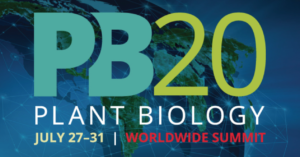 |
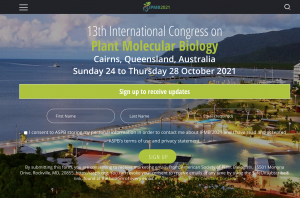 |
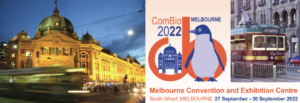 |
You can email us at the communications website if you have upcoming events to promote, virtual and face-to-face. Please also send us any enlightening stories to share.
Tweet to us: @asps_ozplants and Facebook
Phytogen – May 2020
15 May 2020

Welcome to Phytogen for May 2020. In this issue are reports from ASPS award lectures by Ros and Monika. Reflecting on both of these lectures has been especially enlightening and inspiring and hopefully you can draw some encouragement when considering the last few months and for the months to come.
We really (in real-life) look forward to seeing our fellow colleagues, researchers, teachers and students someday once COVID-19 abates. We hope you are managing to keep up with us in the digital world in the meantime. Tweet to us: @asps_ozplants and Facebook Image from favpng.com
Science is objective – with a dash of social context: What I learnt from my own 2019 JG Wood Award Lecture
Prof Ros Gleadow, Monash University
President of The Global Plant Council and a Past-President of ASPS
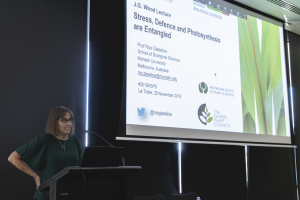
Science is objective and progresses step-by-step. That’s what we are all taught and largely that is true. As I’ve gone on as a scientist, though, it’s dawned on me that our science is also influenced by the society in which we live. In my JG Wood lecture, I outlined how my work on cyanide-producing plants, and plant defence theories more generally, has progressed over the years. I described how knowledge of cyanogenesis has built-up incrementally with input from plant physiology, molecular genetics, taxonomy, biochemistry and ecology[1],[2]. I set this in the context of the principles governing how plants allocate resources to growth and defence, and how that may be affected by climate change[3]. About 5-10% of plants produce cyanogenic glucosides, nitrogen-containing secondary metabolites that break down to release hydrogen cyanide when plant tissues are disrupted, for example when they are munched by herbivores. They can also be used to transport and store nitrogen and may even play a role in mitigating oxidative stress.
The paradigms in which I have operated over my career and used to form hypotheses and aid in interpretation reflect the socio-economic context in which they were in vogue surprisingly well. All have merit, but it is worth thinking about the eras when many of these theories were formulated and gained popularity. In the 1960s, for example, the emphasis was on optimal allocation[4] and coevolution (think summer of love). In the 70s this became less friendly, with the advent of ‘’arms race’’ terminology (think Cold War). In the 80s defence theories were all about resource availability[5] and in the 90s the emphasis was clearly on trade-offs and economics (economic rationalism). This progressed further to the “big house, big car” hypothesis[6] where you end up with haves and have-nots. All of these theories have limitations, and all are true in some circumstances, but it is sobering to realise our science may not be so objective after all.
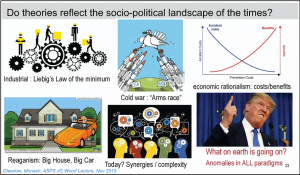 Figure: Somewhat provocative final slide from Ros Gleadow’s JG Wood Lecture on plant defence theories. November 2019.
Figure: Somewhat provocative final slide from Ros Gleadow’s JG Wood Lecture on plant defence theories. November 2019.
So where are we now? We are moving towards an overriding, global theory that accounts for complexity and interrelationships. This was clear in the title of my talk: Stress, Defence and Photosynthesis are Entangled (think Globalisation?). As I prepared my talk, I turned my thoughts to current world politics and realised the whole world has gone mad! No one knows what’s going on! (see Figure). Since November, the world has been shaken by the outbreak of COVID-19. While this pandemic continues, we’re all in some kind of holding pattern. When it’s finally over, and it will eventually be over, no doubt theories of defence will also change to reflect our new world. I wonder what that will be? Will it be about preparedness and (hopefully) compassion? Or will it be more ruthless. Perhaps we should start thinking about this right now so we can be on the front of the new wave of plant defence theories. Take care and stay safe,
Ros Gleadow, May 2020
[1] McKey D. 1974. Adaptive patterns in alkaloid physiology. American Naturalist 108: 305-320.
[2] Gleadow RM, Woodrow IE (2002) Constraints on the effectiveness of cyanogenic glycosides in herbivore defence. Journal Chemical Ecology, 28, 1301-1313.
[3] Gleadow RM, Johnson A, Tausz M (2013) Crops for a future climate. Functional Plant Biology 40: 3-6.
[4] Gleadow RM, Møller BL (2014) Cyanogenic glucosides- synthesis, physiology and plasticity. Annual Review of Plant Biology 65: 155-85.
[5] Coley PD, Bryant JP, Chapin III FS (1985) Resource availability and plant anti-herbivore defense. Science 230: 895-899.
[6] Reznick D, Nunney L, Tessier A (2000) Big houses, big cars, superfleas and the costs of reproduction. TREE 15: 421-425.
Mitochondrial Machineries for import, assembly and proteolysis:
2019 Jan Anderson Award Lecture
Dr Monika Murcha, University of Western Australia.
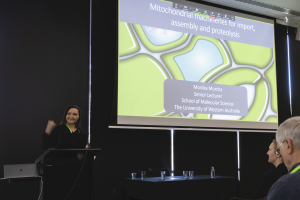
Monika Murcha is a Senior Lecturer at the School of Molecular Sciences, at the University of Western Australia (UWA). She obtained her PhD in Plant Molecular Biology at UWA and was successful in obtaining an ARC Post-doctoral fellowship followed by an ARC Future Fellowship. Monika established her own laboratory at the School of Molecular Sciences in 2014 and has continued her strong collaboration with Plant Energy Biology researchers at UWA and nationally. Monika Murcha’s research has shown that the import of proteins and tRNA from the cytosol is a vital biological point of control for regulating mitochondrial activity, mass and number. She has also uncovered key transporters and receptors necessary for regulating organelle biogenesis, which are indispensable for energy production and optimal plant growth and development.
I am fortunate enough to be able to work towards something that is truly fascinating to me, understanding the complex molecular interactions in the cell that can regulate mitochondrial activity. When I first started my Honours project under the supervision of Prof. James Whelan, I was isolating mitochondria from pea leaves and carrying out protein uptake assays to determine if protein import uptake is a developmentally regulated process. Which it is, and since then I have continued to look for answers to such questions. I have identified key transporters and receptors are vital for regulating the rate of protein import and tRNA into plant mitochondria1, 2. I have discovered dynamic interactions between the mitochondrial protein import apparatus and the respiratory chain3, and most recently, identified novel regulators required for their assembly4. The joy I get from working in the lab and making discoveries, collaborating with brilliant scientists and passing on my skills and knowledge to my students is unbeatable, but being recognised by the ASPS by receiving the 2019 Jan Anderson award is truly amazing.
- Murcha et al., Plant-Specific Preprotein and Amino Acid Transporter Proteins Are Required for tRNA Import into Mitochondria.Plant Physiol. 2016 Dec;1724:2471-2490.
- Wang et al., The mitochondrial protein import component, TRANSLOCASE OF THE INNER MEMBRANE17-1, plays a role in defining the timing of germination in Arabidopsis. Plant Physiol. 2014 Nov;1663:1420-35.
- Wang et al., . Dual location of the mitochondrial preprotein transporters B14.7 and Tim23-2 in complex I and the TIM17:23 complex in Arabidopsis links mitochondrial activity and biogenesis. Plant Cell. 2012 Jun;246:2675-95.
- Ivanova et al.,. A Mitochondrial LYR Protein Is Required for Complex I Assembly. Plant Physiol. 2019 Dec;181(4):1632-1650.
Remember, Monday (today) is…………….
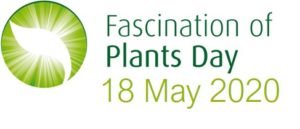 Share your online/digital events on Twitter @PlantDay18May with the hashtags #FoPD and #plantday Also tweet to us: @asps_ozplants
Share your online/digital events on Twitter @PlantDay18May with the hashtags #FoPD and #plantday Also tweet to us: @asps_ozplants
Events for your calendar:
 |
| iLEAPS – OzFlux postponed until 2022 new dates soon…………. |
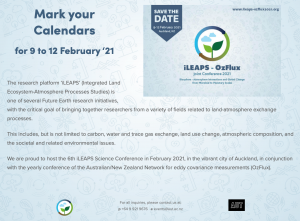 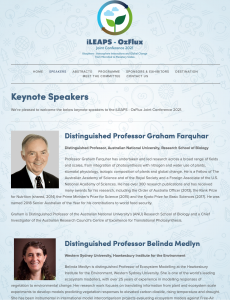 |
 |
You can email us at the communications website if you have upcoming events to promote, virtual and face-to-face. Please also send us any enlightening stories to share.
Take care and stay safe.
April 2020 Phytogen – Plant science during global isolation
17 April 2020
This is quite a bumper digital issue
-

Next month will be Fascination of Plants Day May Monday 18th 2020. This year because of coronavirus, the event will not be coordinated by the European Plant Science Organisation (EPSO) out of Brussels and they are asking us to broaden our social media portfolio. Please respect your national regulation and restriction regarding the coronavirus and share your online/digital events on Twitter @PlantDay18May with the hashtags #FoPD and #plantday
For example, post photos of your house plants……
or let us know by posting to @asps_ozplants . Please also let us know (post @asps_ozplants) if you are registering to watch webinars such as Plantae Presents
or digital courses such as…..
WORLD OF WINE: FROM GRAPE TO GLASS
During this time, many teachers and tutors are moving to online courses. Please make use of Plants in Action to prepare your teaching 🙂
World Earth Day Wednesday 22nd April 2020 – goes digital!
SCIENCE MEETS PARLIAMENT 2019
At the end of November 2019, I represented the ASPS at Science meets Parliament. It was a full-on, intense but very enjoyable couple of days. There were excellent seminars, incredibly constructive workshops, useful and interesting networking opportunities and a chance to talk to people who did science things that I wasn’t aware of or had a clue about.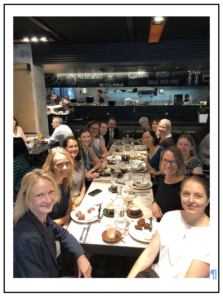
The first day started with a breakfast meeting with other with “ecosystem science” societies – a chance to meet and chat to life science people outside my research area.
Afterwards and dressed nicely (clear instructions were provided with what to wear), we started the first day.
Presentations, seminars and workshops was the order of the day. The importance of communicating with MPs, the responsibility of all scientist to share their expertise and that we needed to work together with politician was emphasised. Winthrop Professor Fiona Wood gave an inspiring presentation. And the workshops and seminars of how to communicate and pitch your science were enlightening and a bit of an education.
The Gala Dinner was the social highlight of the event. Good food, excellent seminars and wonderful table companions. I sat next to a guy who is improving maths education in Indigenous communities, and it was fascinating to hear about his work.
I also met Brian Mitchell, Federal Member of Lyons, Tasmania, to whom I was assigned. He happened to be born 20 km from where I was in the UK, so that was a good start. I invited him to come and visit the Tasmanian Institute of Agriculture, which he did in January this year. An excellent birthday evening for me!
More seminars and workshops on the second day, plus a chance to more formally meet Mr Brian Mitchell. I didn’t get much chance to talk to him – he was called away for a “division”. But I did get him to agree to put himself forward for the STEM Ambassador Programme, which he did. I am now an Ambassador, representing the ASPS, with him as my partner MP.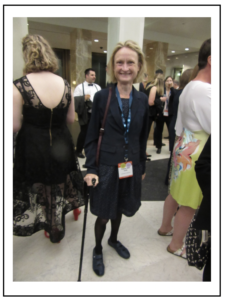
The absolute best bit of the whole event though was Question Time. It was the time of the Angus Taylor affair, so it was particularly entertaining – and loud! Much more boisterous than the UK equivalent.
So, a brilliant couple of days and I would advise anyone who gets the chance, go to this event.
Ricky Milne – CSIRO Agriculture and Food, Black Mountain, Canberra
I was fortunate to be one of this year’s ASPS representatives at Science meets Parliament, held in November 2019. Science meets Parliament is a two-day meeting held annually in Canberra, where STEM professionals learn how science fits in to the workings of parliament and the policy making process, network with others from broad scientific backgrounds and have the opportunity to meet with a parliamentarian to give them a snapshot of their science. Given I don’t closely follow politics, this meeting was extremely useful and informative.
The bar was set high on the first morning, with the opening address given by renowned burns specialist, Winthrop Professor Fiona Wood. She shared her experiences of science and innovation in her career, and the importance of communicating our research findings. We also heard from Australia’s Chief Scientist, Dr Alan Finkel and NZ’s Chief Science Advisor Prof. Gary Evans, who discussed prospects for the future and how to talk science to government. A major focus of this meeting was on developing skills and practicing how to pitch our research in a brief, accessible format, working towards putting this training into practice whilst meeting with a parliamentarian on the second day. Part of this was learning how to capture the audience’s interest in shorter and shorter time periods, until we could do so convincingly in twenty seconds. I was fortunate to practice my pitch with Prof. Fiona Wood, who was extremely down-to-earth and unsurprisingly gave me some great tips. After a packed schedule of networking, skill building and panel discussions, the day concluded at the gala dinner held in the Great Hall at Parliament House.

On day two, we ventured to Parliament House and saw what that goes on during a sitting day – constant bells ringing, parliamentarians scurrying around to vote in time, last minute schedule changes and Prime Minister getting grilled during question time about his phone call to the NSW police chief. After learning how to pitch our science on day one, we were ready to put that into practice when meeting with a parliamentarian on day two. Meetings weren’t scheduled until late and changed up until the last minute. After attending question time, our group was due to meet with Dr John McVeigh, member for Groom, but were rescheduled to meet with Meryl Swanson, member for Paterson, who had other matters to attend but we had a good discussion with her chief of staff. This exemplified the nature of how things unfold at Parliament House.
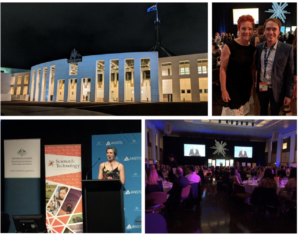 Science meets Parliament isn’t the typical meeting and I did not know what to expect but was pleasantly surprised. I would highly recommend it to anyone considering attending. However, after two days of wearing a suit and uncomfortable shoes, I learned that I definitely prefer casual clothes and a lab coat!
Science meets Parliament isn’t the typical meeting and I did not know what to expect but was pleasantly surprised. I would highly recommend it to anyone considering attending. However, after two days of wearing a suit and uncomfortable shoes, I learned that I definitely prefer casual clothes and a lab coat!
This year ComBio 2020 in Melbourne has been delayed until 2022.

In coming months, stay tuned and watch this space for ASPS society 2020 award webinars.
Last months Phytogen
Last months Phytogen had an article about the Canadian company Medicago researching to develop a coronavirus vaccine. Australians are also researching to develop a vaccine from Australian Native Plants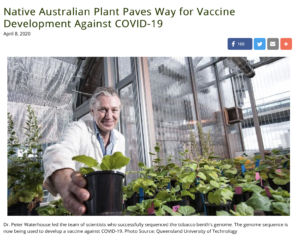
March Phytogen – Such hard times
24 March 2020
Welcome to Phytogen for March 2020. Unfortunately, this year will be remembered as the year our world tackled Covid-19. As we do this over the next few weeks and months, if it helps to alleviate uncertainty you can send me articles that inspire you (georgia.koerber@adelaide.edu.au) and to other members of our communications committee for sharing on Phytogen. Please include some commentary about why they inspire you and if they are in your research area. It would be awesome to receive some material where plants have contributed to solving global problems such as we are facing now, in the past or future.
To start, Chris Cazzonelli from the Hawkesbury Institute, Western Sydney University (WSU) has sent research by WSU and ANU. Click on the link or head to the website: https://phys.org/news/2020-03-darkness-unravel-energy.html. The research has discovered new chemical communication pathways that determine how plants change when they emerge from darkness in the soil to light with implications for their energy generation.
Something I have been amazed to read about is plants being used to create vaccines, as an alternative to chicken eggs; as bioreactors for growing vaccine proteins. The biopharmaceutical company from Canada, Medicago doesn’t work with a live virus, instead the team insert a genetic sequence into a soil bacteria, which is taken up by the plants, which then reportedly begin to produce the protein that can then be used as a vaccine. They soon hope to submit this unique technology for FDA approval. The difference between plants and eggs is “we go directly to producing the vaccine or the antibody without having to propagate the virus” Mr Bruce Clark said, CEO of Medicago.
This year, ASPS has had a new Honorary Secretary Simon Williams from ANU. Below he writes about his research.
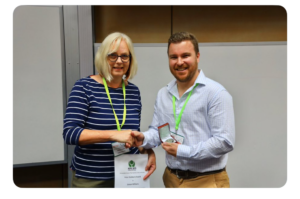
Simon Williams 2019 Peter Goldacre Recipient with ASPS President Kathy Soole at ASPS2019 LaTrobe University.
The structural-basis of plant innate immunity
It is estimated that plant diseases account for up to 15% of crop loses worldwide, presenting a significant economic, environmental and social challenge in a world facing increased demands on food, fibre and biofuels. While the lifestyles of plant pathogens are diverse, a common feature is the use of secreted proteins, collectively known as effectors, which promote pathogen virulence and facilitate disease. During infection plant pathogens can mobilise 10-100s of effector proteins. In response, plants utilise both extracellular and intracellular multi-domain immunity proteins to detect effectors and this recognition leads to disease resistance. The intracellular immunity receptors, known as nucleotide-binding oligomerisation domain-like receptors (NLRs), are arguably the most important plant immunity receptor and can recognise specific effectors to provide protection against potential pathogens. Plant genomes contain hundreds, in some cases thousands, of NLR genes, to ensure maximum protection within their environment. Despite this, resistance is defeated when this repertoire of NLRs can no longer perceive the presence of an effector during the plant-pathogen interaction. We are interested in understanding how NLR proteins perceive effectors and activate disease resistance pathways. To study this, we use a multidisciplinary approach harnessing the power of protein structural biology, biochemistry and biophysics to inform our studies in plants. The Peter Goldacre award recognises the contributions that I have made to understanding how NLR proteins signal via protein-protein oligomerisation through their N-terminal (see papers below). Of course, these achievements were the result of a large team effort and involved numerous national and international collaborators.
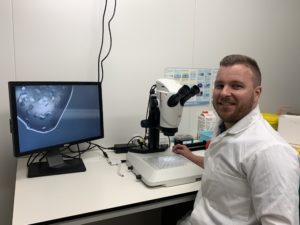
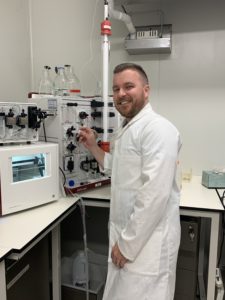
Recently, I started my own laboratory in the Division of Plant Sciences within the Research School of Biology at the Australian National University.
Simon in the lab working with plant proteins.
Our Structural Plant Immunology laboratory seek to understand the molecular-basis of fungal pathogenicity and plant innate immunity. A major focus of our work is the development of methodologies that will enable the engineering of synthetic plant immunity receptors. If successful, we believe these tools and techniques could revolutionise the number of NLR genes available to plant breeders to reduce losses induced by pathogens in instances where resistance does not exist or has been overcome.
I’m excited to take on the role of honorary secretary for ASPS. I joined ASPS at the start of my PhD and have benefited significantly through the collegiality and support that the society provides. I look forward to supporting and promoting the society in my new role.
Williams SJ, Sohn KH, Wan L, Bernoux M, Sarris PF, Segonzac C, Ve T, Ma Y, Saucet SB, Ericsson DJ, Casey LW, Lonhienne T, Winzor DJ, Zhang X, Coerdt A, Parker JE, Dodds PN, Kobe B, Jones JDG (2014). Structural basis for assembly and function of a heterodimeric plant immune receptor. Science, 344: 299-303.
Casey L, Lavrencic P, Bentham AR, Cesari S, Ericsson DJ, Croll T, Turk D, Anderson PA, Mark AE, Dodds PN, Mobli M, Kobe B, Williams SJ (2016). The CC domain structure from the wheat stem rust resistance protein Sr33 challenges paradigms for dimerization in plant NLR proteins. PNAS. 113 (45), 12856-12861.
Zhang X, Bernoux M, Bentham AR†, Newman TE, Ve T, Casey LW, Raaymakers TM, Hu J, Croll TI, Schreiber KJ, Staskawicz BJ, Anderson PA, Sohn KH, Williams SJ, Dodds PN and Kobe B. (2017) Multiple functional self-association interfaces in plant TIR domains. PNAS. 114: E2046-E2052.
Keep these meetings in your calendar: ComBio2020 and IPMB2021
 Keep sending your images to Tam Salter for our ASPS banners.
Keep sending your images to Tam Salter for our ASPS banners.
Please ensure they are .PNG , .jpg, .TIFF, or .pdf, with greater than 300 dpi, email: william.salter@sydney.edu.au
If the images have people, they will have to sign a permission form: ASPSbanner2020
Please print the permission form and have them sign then send along with your image to Tam, we look forward to receiving your images.
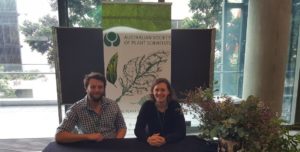
Phytogen February 2020
05 February 2020
Welcome to Phytogen for February. 2020 is the International Year of Plant Health. You can read more at the FAO website.
Also occurring this week will be United Nations International Day of Women and Girls in Science.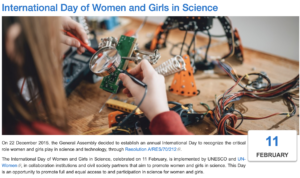
It is very timely then; to plan conferences and workshops for the year. If you want to advertise an event use this link. Below are some to get you thinking.
1. THE PLANT NUTRITION TRUST is inviting applications for awards to assist in carrying out a study tour or to attend a conference or such other activity related to their stated objectives. The TRUST has been established to encourage and promote research and technology transfer in the areas of plant mineral nutrition, soil fertility, fertiliser and soil amendment technologies and certain abiotic stresses. Related topics in agronomy and plant breeding etc will also be considered.
Awards will be made to promising PhD students, post-doctoral students and early-career scientists working in the areas mentioned above. Applicants must be currently working in Australia and linked with a recognised university or relevant institution. Details and application forms available by clicking on the below links. Applications close 20th March 2020.
pdf: PlantNutritionTrust_Intro&Appl_2020
word: PlantNutritionTrust_Intro&Appl_202
2. FOOD AND WATER SECURITY INTERNATIONAL WORKSHOP: ENGINEERING AQUAPORINS TO BOOST CROP YIELDS AND WATER RECYCLING TECHNOLOGIES
12 May 2020 to 15 May 2020.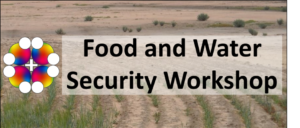
What types of new biotechnologies are needed to ensure food and water security in the future?
Join us for a workshop at the Shine Dome in Canberra (13-15th May 2020; https://www.shinedome.org.au/whats-on) to explore how we can use and engineer aquaporin proteins to boost crop productivity and advance water filtration technologies.
Student travel support is available thanks to ASPS – please apply, more details below. Discount early bird registration is now open and talks selected from abstracts will receive registration reimbursement – https://www.eventbrite.com.au/e/workshop-on-engineering-ion-channel-aquaporins-and-boosting-food-security-tickets-78557334101
Examples of workshop highlights include:
- Hear from Professor Steve Tyerman (University of Adelaide) and Professor Christophe Maurel (B&PMP, Montpellier) about the latest developments in controlling water relations, cell signaling and regulation of hydraulics in plants.
- Learn about the link between aquaporin function and cancer cell metastasis and the discovery of aquaporin ion channel features from Professor Andrea Yool’s research (University of Adelaide).
- Learn about the roles of aquaporins in influencing crop plant physiology from Professor Francois Chaumont’s research (UCLouvain, Belgium) on maize aquaporins, Professor Maki Katsuhara’s research (Okayama University) on barley aquaporins and A/Professor Tomoaki Horie’s work on rice aquaporins (Shinshu University).
- Learn about imaging the movement of element isotopes to understand aquaporin function from Professsor Keitaro Tanoi and A/Professor Natsuko Kobayashi (University of Tokyo).
- Discover new directions in technology development for water filtration from Aquaporin Asia’s Dr Sun Guofei. These technologies are used to purify astronaut waste water in space and can help us sure up our future water security on Earth.
- Build your knowledge in understanding how aquaporins help living cells tolerate osmotic stress and how we can use this information to create the biotechnologies of the future!
The 2020 International Ion Channel Aquaporin Workshop creates the opportunity to facilitate sharing knowledge, ideas and results in the area of studying the function and applications of ion-channel aquaporins. We have a particular focus on research related to engineering plant aquaporin function towards boosting future food security, and on research related to the study of ion channel aquaporins in plants and other Kingdoms of life.
We are looking forward to discussing potential avenues to engineer aquaporin function towards supporting future stability in crop productivity, improve water security and determine signaling processes that influence aquaporin function. Topics related to aquaporin permeability, regulation, signaling, physiological roles and evolutionary origins will be covered in the workshop.
There will be talks selected from submitted abstracts and registered speakers selected from abstract submissions will receive registration reimbursement. Courtesy of the Australian Society of Plant Scientists there is support for PhD/ECR student travel, and it would be wonderful if you are happy to encourage PhD/ECR students working on relevant research to contact us about sending in an abstract and applying for PhD student travel support towards participating in the workshop. The workshop is supported by the Australia-Japan Foundation and the Australian National University.
Further information related to the workshop can be found at the following webpage: https://biology.anu.edu.au/news-events/events/workshop-engineering-ion-channel-aquaporins-and-boosting-food-security
3. RN Robertson Travelling Fellowship. Applications opened 3rd February and close 2nd March 2020. Details here
4. ComBio2020 and IPMB2021
Here are reports from Kara Levin and Celine Mens, 2019 Plant Nutrition Trust Awardees.
Report on the Plant Biology 2019 conference: Plant Nutrition Trust, Kara Levin, University of Adelaide.
Plant Biology 2019, an event hosted by ASPB (American Society of Plant Biologists), took place in San Jose, California. I had the privilege to attend this conference along with over 1400 attendees. The conference covered a large number of areas within plant biology over the five days and was set-up to include major symposia sessions in the morning, networking events over lunch, and smaller specialised concurrent sessions in the afternoon. The major symposia talks covered some of the most interesting topics, many of them focused on seeing the larger picture within their niche field of research. An important concept presented at the conference was that the plant receptors used for triggering a symbiotic relationship with a pathogen were the same as those used to trigger a plant immune response – which raises the question on how such contrasting outputs are regulated by the same receptors. The data presented indicates that these receptors are influenced by the nutrient status of the plant. A plant experiencing nutrient deficiency is more likely to trigger a symbiotic response while one that is nutrient-sufficient will activate an immune response. This is an interesting concept for rhizosphere interactions, where a plant that is perhaps nitrogen deficient will induce symbiosis with microorganisms in the soil in order to reach sufficient nitrogen levels. This idea of dynamic plant responses should be considered in plant nutrition research.
Another fascinating talk was during the ‘Plant Synthetic Biology’ section. A group at the Max Planck Institute for Terrestrial Microbiology have created a more efficient Calvin-Benson-Bassham (CBB) cycle by using synthetic enzymes. Although applying this CO2-fixing system into agriculture is still in the research phase, it provided insights into the kind of ground-breaking research that is being made possible with new emerging technologies.
I presented a novel discovery from my PhD research on interactions between cereal cyst nematode and wheat during the symposia of ‘Plant-Biotic Interactions’. This was an exciting opportunity to discuss my results with a range of international researchers working on similar plant interactions. These discussions helped confirm my research findings as other researchers provided further evidence from their independent studies which reaffirmed of these novel plant-nematode interactions observed in my research. I sincerely thank ASPS for awarding me the Plant Nutrition Trust Travel Scholarship to assist in my conference travels. Attending Plant Biology 2019 was a great experience and perfectly timed as I finish writing a manuscript on my presented research as well as the rest of my PhD thesis.
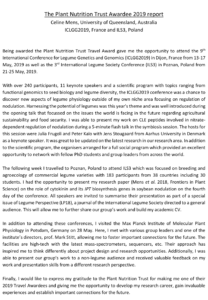
Lastly, and importantly, there is only one week left to apply for our Society awards. Apply Now!
We are also rolling out banners for each of our states to display at conferences, meetings and workshops. See the banner mask below.

If you have some great images, email them to Tam Salter.
Please ensure they are .PNG , .jpg, .TIFF, or .pdf, with greater than 300 dpi, email: william.salter@sydney.edu.au
If the images have people, they will have to sign a permission form: ASPSbanner2020 Please print the permission form and have them sign then send along with your image to Tam, we look forward to receiving your images.

January 2020 Phytogen
27 January 2020
It is a New Year and a new decade. Over the last couple of months, you might have been reflecting on how tough the ecology in our country, Australia; has to be. Our plants and soils are quite well adapted to recover after the last couple of months of bushfires, and hot days with lots of sun exposure.
There are many incredible articles to read. Click on the pictures to read articles about recovery and protecting the Wollemi pine.
There have also been downpours of rain and hail for our plants to contend with. Another post from 2014 explains the science.
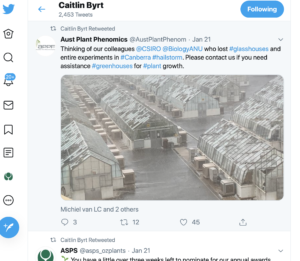
Throughout 2020 we wish you all the best for resuming your experiments and interpreting the results. Nominations are now open until the Friday 14th February 2020 for our society awards. Follow this link to the awards page and to find out all the details.
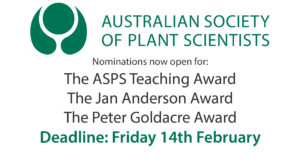 Upcoming in February, is NEPS, with open consultation in each state.
Upcoming in February, is NEPS, with open consultation in each state.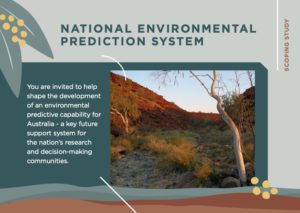
Our meeting is in September 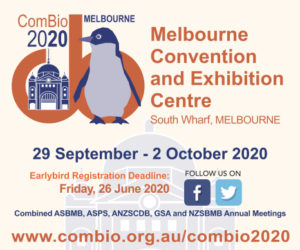 and also save the date for Sunday 24th October 2021.
and also save the date for Sunday 24th October 2021.
IPMB2021 will be an event not to be missed. You can keep up with the community as this meeting progresses by checking the plantae website.
December 2019 Phytogen
15 December 2019
Welcome to the last edition of Phytogen for 2019. We enjoyed seeing you at our annual conference last month. La Trobe University was delighted to host the Australian Society of Plant Scientists conference from 26 to 29 November in the stunning Centre for AgriBioscience (AgriBio) in Melbourne. Over 200 participants attended the meeting including both national and international delegates from our wonderfully diverse community of plant scientists, agronomists, nutritionists, educators, industry and government representatives.
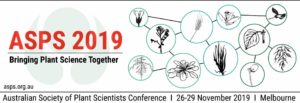
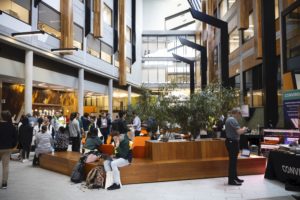
The meeting kicked off with a student networking lunch where students gained stickers each time they engaged each other in conversation. Extra stickers were awarded by chatting with the international keynote speakers including Prof Nicolaus von Wiren and Dr Fabian Pfrengle (Germany), Prof Jianping Hu, Prof Dan Szymanski and A/Prof Julie Law (USA), Prof George Bassel (UK) and Prof Mao Long (China). Congratulations to Fiona Kang who collected the most stickers and the student networking prize! The first session also highlighted the amazing work of the Society’s students with ASPS student representatives Mr Yingxuan Ma and Mr Ronan Broad undertaking chairing duties. The great atmosphere continued with informative and entertaining talks by nutritionist Prof Jennie-Brand Miller and the ‘poster teaser’ presenters before relaxing at the Welcome dinner and catching up with friends and colleagues.
The meeting continued with a packed agenda and some new themes including insights into medicinal agriculture and emerging and transformational technologies in genomics and phenotyping. The program also featured excellent presentations from ASPS award winners’ Dr Monika Murcha (Jan Anderson Award), A/Prof Sigfredo Fuente (Teaching Award), Prof Ros Gleadow (JG Wood Award) and Dr Simon Williams (Peter Goldacre Award).
A shared biotic intera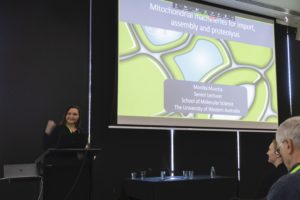 ctions session on the final day with the Australasian Plant Pathology Society Conference celebrating their 50thanniversary was also a highlight. The Grains Satellite meeting held thereafter gathered researchers and breeders from across the country and focussed on the pipeline to delivering enhanced grain yield in addition to quality traits relating to food applications and nutrition.
ctions session on the final day with the Australasian Plant Pathology Society Conference celebrating their 50thanniversary was also a highlight. The Grains Satellite meeting held thereafter gathered researchers and breeders from across the country and focussed on the pipeline to delivering enhanced grain yield in addition to quality traits relating to food applications and nutrition.
Dr Monika Murcha (Jan Anderson Award)
Social events at ASPS 2019 included tours of the La Trobe Wildlife Sanctuary, Posters and Drinks sessions and a Society dinner at the new La Trobe Sports Park pavilion. Across the week there was a fantastic atmosphere in AgriBio with a real sense of community and collaboration. The meeting was a great opportunity to share knowledge and resources, generate new ideas and identify avenues for translation. A huge thanks to all those who made it a success, especially our wonderful undergraduate, Honours and PhD student volunteers and poster judges.
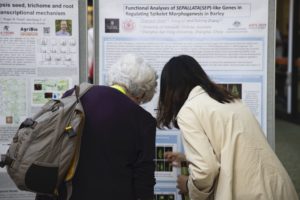
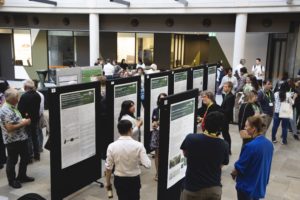
In addition, we extend our sincere thanks to the event sponsors including GRDC, BioPlatforms Australia, Agriculture Victoria, Conviron, Laftech, Agilent, Cann Group Limited, ARC Centres of Excellence Plant Energy Biology and Translational Photosynthesis, GlycANZ, La Trobe Institute for Agriculture and Food (LIAF), ARC Medicinal Agriculture Hub and Department of Animal, Plant and Soil Sciences at La Trobe, Australian Plant Phenomics Facility and the journal Plants.
We look forward to seeing you again next year at ComBio at the Melbourne Convention Centre (29 September to 2 October, 2020, website www.combio.org.au/combio2020/) and bringing our wonderful society of plant scientists closer together.
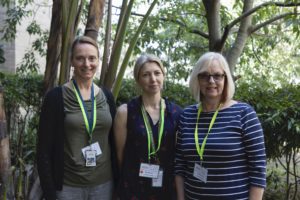
Dr Kim Johnson and Dr Monika Doblin with Professor Kathleen Soole (ASPS President) on behalf of the ASPS 2019 Meeting Organising Committee.
Photos taken by William Salter.
During the AGM and in Novembers Phytogen, we outlined how you can vote for state representatives. If you haven’t yet voted, you can ahead of ComBio2020. Go to: https://www.surveymonkey.com/r/8KH6FV5
We need 2/3 rd of financial members to vote. If you would like to be part of the discussion click HERE. To renew your membership so you are a financial member click HERE. You can request a new password be sent to your registered e-mail address.
We also want to acknowledge Janet Wheeler (La Trobe) and John Evans (ANU) awarded life members. Thank you for all the work you do for our society. Catch the buzz with lots of ARC funding for plant science and our ASPS Plant Science Education Representative Dr Beth Loveys with Dr Karina Riggs has won the University of Adelaide Stephen Cole the Elder Award for Excellence and the Vice Chancellor and President’s Award for Excellence. She writes for us below.
Like all higher education institutions, the University of Adelaide awards excellence in a range of different areas of teaching each year. This year I was honoured to be the recipient, along with my colleague and dear friend Karina Riggs, of the University of Adelaide’s premier teaching award, Stephen Cole the Elder Award for Excellence in the category of Leadership, Support and Enhancement of Teaching Practice and also the Vice Chancellor and President’s Award for Excellence.
As Education Specialists, Karina and I work as a team to enhance engagement, learning outcomes and the learning experience for our students at the Waite campus of the University of Adelaide. We achieve this by supporting colleagues to reflect upon their own teaching practices, embrace change and have the courage to adopt new learning and teaching initiatives through a variety of avenues such as; Innovative Teaching @ Waite, Professional Development workshops and co-facilitation of the University wide Community of Practices.
One of the characteristics of our journey from being part-time Associate lecturers to full-time Senior Lectures and leaders in learning and teaching has been the amazing mentors who have guided us along the way. We have always been open to learning from and listening to colleagues not only within our discipline of plant science but also from diverse areas such as medicine, dentistry and the professions.
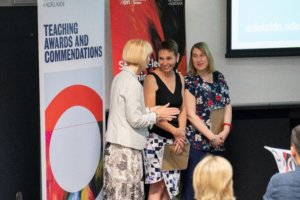 ASPS Plant Science Education Representative Dr Beth Loveys with Dr Karina Riggs from University of Adelaide.
ASPS Plant Science Education Representative Dr Beth Loveys with Dr Karina Riggs from University of Adelaide.
We have led by example by embedding innovative teaching practice in all of our courses and most importantly building authentic working relationships with our students. Our teaching is largely driven by the idea that once the students know that you care they soon care about how much you know (a variation on a statement attributed to Theodore Roosevelt). Being recognised for your contribution to improving the student learning and experience at University is obviously wonderful but more importantly it creates opportunities to continue to promote and support high quality science teaching across the University and more broadly the sector.
Nominations are now open for our 2020 awards. To read more go to: https://www.asps.org.au/awards. Keep up with us on twitter @asps_ozplants
Lastly, we hope you can manage to keep cool over Christmas, our thoughts are with those affected by drought and bushfire. We hope there will be opportunity for recharge, rest and some joy.
 giphy.com
giphy.com
Recent Posts
Tags
Archives
- June 2025
- May 2025
- April 2025
- March 2025
- February 2025
- January 2025
- December 2024
- November 2024
- October 2024
- September 2024
- August 2024
- July 2024
- June 2024
- May 2024
- April 2024
- February 2024
- January 2024
- November 2023
- October 2023
- September 2023
- August 2023
- July 2023
- June 2023
- May 2023
- April 2023
- March 2023
- February 2023
- December 2022
- November 2022
- October 2022
- September 2022
- August 2022
- July 2022
- June 2022
- May 2022
- April 2022
- March 2022
- February 2022
- January 2022
- December 2021
- November 2021
- October 2021
- September 2021
- August 2021
- July 2021
- June 2021
- April 2021
- March 2021
- February 2021
- January 2021
- December 2020
- November 2020
- October 2020
- September 2020
- August 2020
- July 2020
- June 2020
- May 2020
- April 2020
- March 2020
- February 2020
- January 2020
- December 2019
- November 2019
- October 2019
- September 2019
- August 2019
- July 2019
- June 2019
- May 2019
- April 2019
- March 2019
- February 2019
- January 2019
- December 2018
- November 2018
- October 2018
- September 2018
- August 2018
- July 2018
- June 2018
- May 2018
- April 2018
- March 2018
- February 2018
- January 2018
- December 2017
- November 2017
- October 2017
- September 2017
- August 2017
- July 2017
- June 2017
- May 2017
- April 2017
- March 2017
- February 2017
- January 2017
- December 2016
- November 2016
- October 2016
- September 2016
- August 2016
- July 2016
- June 2016
- May 2016
- April 2016
- March 2016
- February 2016
- January 2016
- December 2015
- November 2015
- October 2015
- September 2015
- August 2015
- July 2015
- June 2015
- May 2015
- April 2015
- March 2015
- February 2015
- January 2015
- December 2014
- November 2014
- October 2014
- September 2014
- August 2014
- July 2014
- June 2014
Copyright 2017 Australian Society of Plant Scientists Disclaimer & Privacy
Website by Michael Major Media

